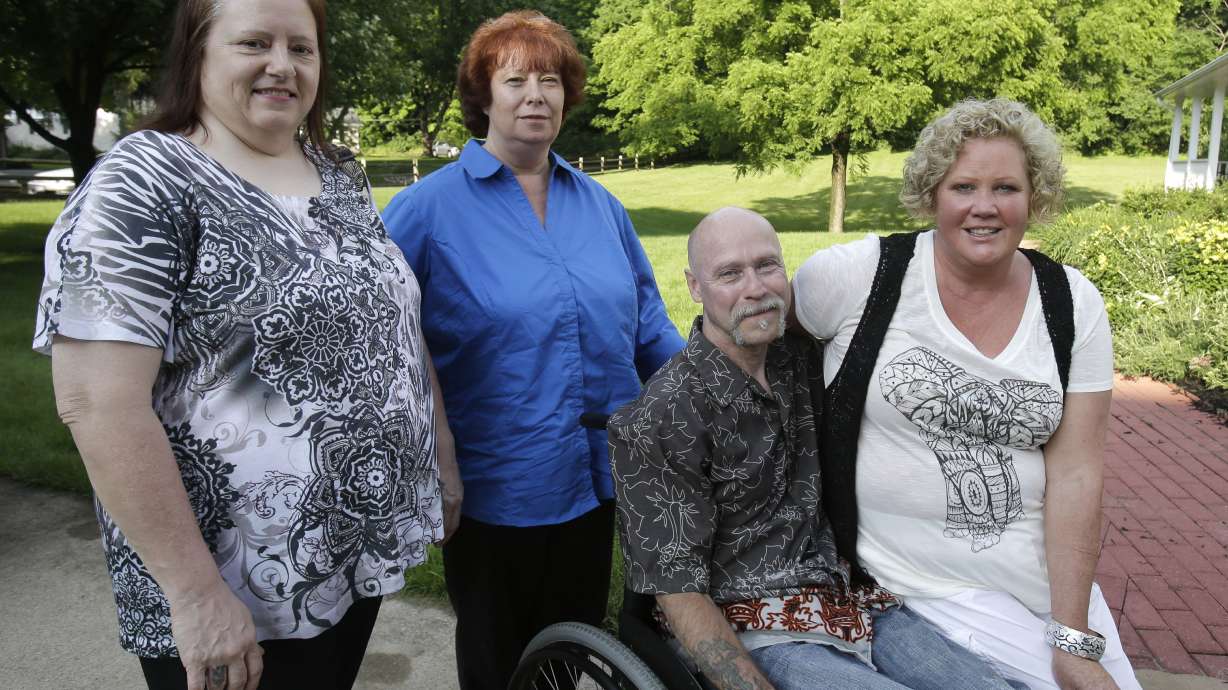Estimated read time: 4-5 minutes
This archived news story is available only for your personal, non-commercial use. Information in the story may be outdated or superseded by additional information. Reading or replaying the story in its archived form does not constitute a republication of the story.
MCCAYSVILLE, Ga. (AP) — They were adopted off-the-books decades ago, scattered by a Georgia doctor who took $100 or $1,000 or something in between to send desperate couples home with new sons and daughters. Now some of the adoptees have turned to fresh DNA testing in hopes of reconnecting with the biological families they never knew, before time runs out.
"This is our shot in the dark, really," said Melinda Elkins Dawson, one of more than 200 newborns relocated to other states from the clinic in McCaysville in the 1950s and '60s.
As children, their true ancestry was erased on birth certificates falsely listing adoptive couples as their natural parents. Genetic codes are the only links left.
So Dawson worked with Ohio-based DNA Diagnostics Center to arrange free cheek-swab sampling Saturday at a motel in Ducktown, Tennessee, a few miles from where the clinic was located. The adoptees hope potential relatives from the area come forward to give samples, even if they remain anonymous.
"We're not trying to make anyone look bad," she said. "We're just trying to get some answers. Every adopted child has questions. We deserve some answers."
The doctor who ran the McCaysville clinic, Thomas Hicks, died in 1972. There is unsettled debate about whether he sold babies on the black-market, charitably helped those in need while merely recouping his expenses, or perhaps did both.
The adoptees giving new DNA samples don't care much about his motives. They're looking for links that could flesh out family trees, fill in medical histories or salve the burn of simple questions: Where did I come from? What did my parents look like? Do I have more siblings?
That last one has been on Bill Palmisano's mind all week, since he met Dawson on Monday. They grew up in different adoptive families in northeast Ohio, but records list their McCaysville birth dates a day apart, and they've heard from other adoptees that the written dates were sometimes slightly off.
Palmisano didn't notice much obvious resemblance to Dawson, but his excited blue eyes met hers and sold her on a possibility. Maybe, just maybe, this guy could be her twin brother.
Dawson, who lives outside Canton, Ohio, is among those who have been down this path before, in the late 1990s, when one adoptee's search for her parents revealed there might be hundreds of "Hicks babies." Some of them gave DNA samples for testing.
It turned a spotlight on McCaysville, a onetime copper mining town near where Georgia borders Tennessee and North Carolina, and on Hicks, a complicated figure whose background included a drug-selling conviction and an illegal abortion charge. Locals defended him as a good doctor who cared for mothers who were young, unwed or in complicated situations with nowhere else to turn.
It's a subject many residents want to leave in the past.
"Everyone accepted that it happened in this town and they just rather it go on," said Mayor Thomas Seabolt, who doubts many people will come forward Saturday.
The adoptees emphasize they aren't trying to make waves in McCaysville, a town of roughly 1,000, tucked amid mountains in an area trying to capitalize on tourism and rafting along the Ocoee River. They say they just want information, though the specifics vary from person to person.
Diane Warner of Grand Rapids, Michigan, said two earlier DNA samplings led nowhere for her, so she'd welcome any fresh lead.
Mark Eckenrode of Orlando, Florida, longs to sort out his genealogy — the real one, not the one he spent a decade working on before he learned at age 36 that he'd been adopted. He takes pride in his connection to McCaysville, which he describes as hardscrabble, with hard-working people.
"My identity is up there. It's up in the hills. It's up in the mines," said Eckenrode, 53.
Ohioans Cyndy Stapleton and Diane Conrad already connected with blood relatives after the earlier DNA testing and hope to find more. Stapleton said her birth mother, whom she met, had three sons who may have been adopted. Conrad, who found a biological sister, would like to find her mother.
Paul Payne, an adoptee living in Hixson, Tennessee, is more focused on his father. He says he found the woman he believes was his birth mom, based on details he learned from his former baby sitter. He talked to the woman once, he says, when he called her at a nursing home. She said hello, and he hung up, at a loss for words. They didn't connect again before she died.
As for Palmisano, he can't make the trip to Georgia from his home in Streetsboro, Ohio, but promises Dawson he'll do DNA sampling. The diagnostics company will run some tests, and within weeks, they could learn how their samples compare.
Maybe, just maybe, they'll have more in common than blue eyes.
___
Franko reported from North Canton, Ohio. Find the reporters on Twitter at https://www.twitter.com/kantele10 and https://twitter.com/AlexSanz.
Copyright © The Associated Press. All rights reserved. This material may not be published, broadcast, rewritten or redistributed.








